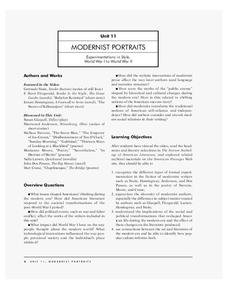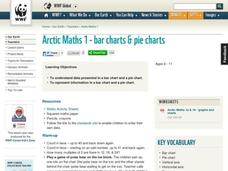Humanities Texas
A President's Vision: Theodore Roosevelt
Through an engaging, interactive experience analyzing primary sources, invite your young historians to take a closer look at the presidency of Theodore Roosevelt.
International Reading Association
Children’s Choices 2014
Books for kids, chosen by kids! What could be better? This packet is made up of book lists, each with approximately 30 books included, organized by age group. Kids will enjoy the summer reading materials they choose from this resource!
US Department of Agriculture
Serving Up My Plate
Offer your youngsters an extra helping of nutritional knowledge and healthy tips with this resource, which centers around the MyPlate nutritional guide and offers three "courses" of plans and worksheets on the food groups and the...
Howard Hughes Medical Institute
EarthViewer
Can you imagine Washington DC and London as close neighbors occupying the same continent? Learners will be fascinated as they step back in time and discover the evolution of the earth's continents and oceans from 4.5 billion years ago to...
Virginia Department of Education
The Effects of Heat and Acid on the Enzyme Catalase
How quickly do enzymatic reactions occur? Assist the class as they examine heat and pH change to determine the rate of chemical reactions using catalase as an enzyme. Watch them "glow" with excitement!
NOAA
Biological Oceanographic Investigations – What's in That Cake?
Have you ever tried to find hidden items in a picture when you don't know what you are looking for or how many things are hidden? A lesson applies that same concept to sampling the deep sea habitats. Participants must first create a...
American Chemical Society
Changing State: Condensation
When you have a cold drink and you notice the water forming on the outside, it is literally pulling the water from the surrounding air to form the condensation. After watching a demonstration of condensation forming on a glass,...
American Chemical Society
Temperature and the Rate of a Chemical Reaction
Putting glow sticks in the freezer makes them last longer, but why is that? Lesson focuses on how temperature impacts the rate of a chemical reaction. It begins with a teacher demonstration, then scholars design their own experiments...
NOAA
What's the Big Deal?
Who knew that a possible answer to Earth's energy resource problems was lurking deep beneath the ocean's surface? Part four of a six-part series introduces Earth Science pupils to methane hydrate, a waste product of methanogens. After...
Montana State University
Sea Floor to Summit
Who knew that mountain formation could be so entertaining? Leanr how mountains form with a resource on Mount Everest. Activities to guide learning include a simulation, project, videos, coloring activities, and worksheets.
Smithsonian Institution
Students’ Response to 9/11—A Documentary Report
Young historians research the devastating attacks of 9/11 and use that information to script their own documentaries. The follow-up activity includes recording the documentary and conducting classmate interviews,
Annenberg Foundation
Modernist Portraits
How did literature reflect people's attitudes in post-World War I America? A lesson explores the topic using a variety of activities. Individuals watch and respond to a video; read author biographies and engage in discussion; write...
Smithsonian Institution
Changing Gender Roles on the Home Front
Many historians discuss how gender roles changed because of World War II, but how did this come to be? An informative resource challenges scholars to do some digging and research the information for themselves. They research how...
Ed Worksheets
Read the Story
Want to boost your readers' comprehension skills and strategies? Look to these five pages, each with a short story and questions to answer covering main idea, facts, sequence of events, context clues, conclusions, and making inferences.
Polar Trec
Is There Salt in a Glacier?
What can conductivity tell us about a glacier? Groups analyze glacial melt to determine salt content through an analysis of the pH and conductivity measurements of two samples. Groups then determine the source of the salts.
Curated OER
Calorimetry Problems
In this calorimetry instructional activity, students complete 30 problems. They calculate the change in heat of a system given the mass and the change in temperature of the system. Students also find the final temperature of a reaction...
Curated OER
WS 2.5 Dimensional Analysis
Science students apply dimensional analysis to relate quantities in six different problems. They consider the cost of steak, a young man's growth rate, a medicine prescription, fuel efficiency, and more. This worksheet is a great way to...
Curated OER
Reverse Construction Verb: Gustar
What does reverse construction mean? This reference guide gives models and explanations, bringing confusion down to a minimum. It discusses some of the differences in English sentence construction and Spanish sentence construction. A...
K5 Learning
What Police and Detectives Do
What do police and detectives do to keep their community safe? Six short-answer questions make up a worksheet designed to reinforce reading comprehensions skills while providing information about police officers and detectives.
Curated OER
Blubber Mittens:Adaptation to Cold Climates
Students get a first hand look at the benefit of a "blubber layer" in cold climates through a simulation using vegetable shortening and icy water. Through this simulation, students examine how adaptations help organisms survive.
World Wildlife Fund
Bar Charts & Pie Charts
Learn about life in the Arctic while practicing how to graph and interpret data with this interdisciplinary instructional activity. Starting with a whole group data-gathering exercise, students are then given a worksheet on which they...
Polar Trec
Foraging for Fish in a Melting Arctic
How much do you know about the black guillemot of the Arctic region? With great background information, images, and a quick discussion, the class will learn all about the plight of the foraging seabird as they play a fun game. First,...
Curated OER
Warm Up Exercises
Find an extensive list of warm-up, cool-down, and strength-training exercises perfect for all ages. Each move includes written description as well as an image. Use these for your own reference or to give to students who are training on a...
EngageNY
The Opposite of a Number's Opposite
It's said that opposites attract, but what about opposites of opposites? Individuals learn about the opposite of opposites using number lines. They complete a group activity in which members determine the opposite of opposites of integers.
Other popular searches
- Ice Cream
- Ice Age
- Ice Cube Melting Experiment
- Ice Breakers
- Ice Breaker Games
- Ice Hockey
- Dry Ice
- Ice Skating
- Ice Land Volcanoes
- Dry Ice Experiments
- Ice Breaker Activities
- Ice Cream Graph

























